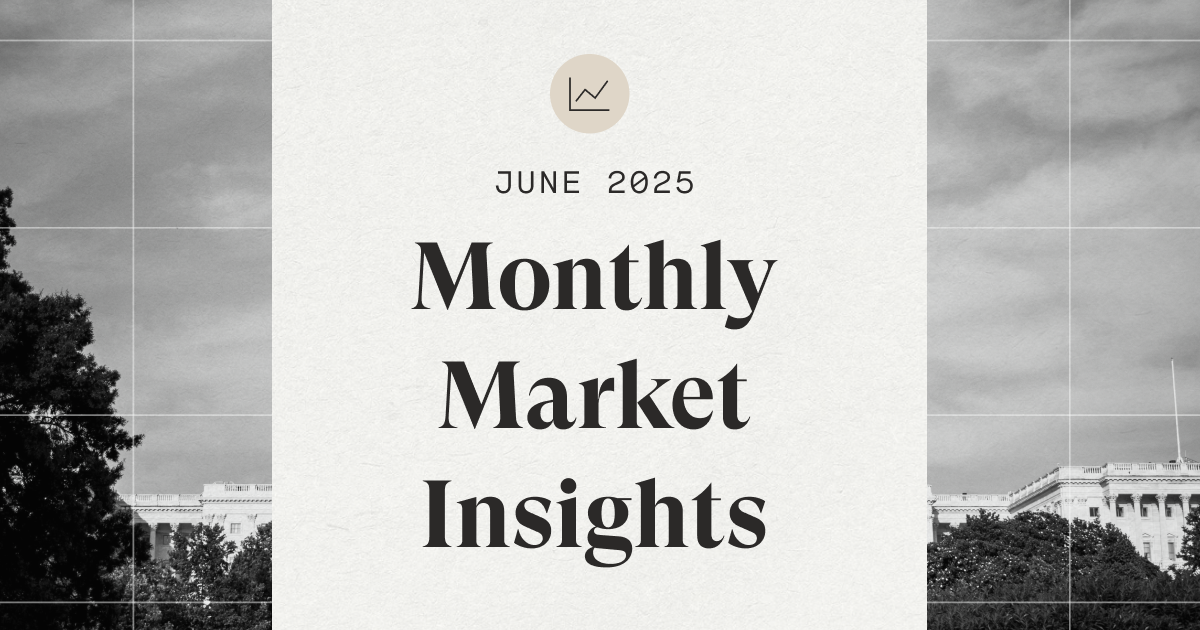Monthly Market Insights: The New Tax Landscape
An in-depth analysis of the 'One Big Beautiful Bill Act' and its potential implications for your financial future.

When I was growing up, my dad (mechanical engineer turned stockbroker) used to tell me that he was happy paying more income tax because higher taxes meant he made more money that year. The more money he made, the more he would pay in taxes, assuming rates were unchanged. I’m not sure if he was looking for silver linings or teachable moments, but regardless, he is the only person I know who had such an attitude of gratitude when it came to paying taxes.
Most of us hate paying taxes — whether on earned income, property, goods and services, investment gains, gambling winnings, prizes, etc. — it doesn’t matter. Uncle Sam wants his cut. So “beautiful” wasn’t the word that naturally came to mind when President Trump announced his new tax legislation which was passed by the House of Representatives last week. Known as “One Big Beautiful Bill Act” (OBBBA), this 1,110 page proposal spells out a number of permanent extensions to earlier tax changes, as well as new changes that will impact nearly everyone.
Despite this sweeping proposal, Moody’s downgrade of US debt, rising bond yields, and Trump’s continuous tariff announcements, May turned out to be a great month for US stocks. The S&P 500 was up more than 6%, the DJIA gained 3.9%, and the NASDAQ climbed almost 10%. Inflation fell to 2.1% in April but corporate earnings took a hit in Q1 and profits are expected to be squeezed further given higher costs from tariffs.
Uncertainty and confusion continue to dominate investor sentiment. And as we often say at Ellevest, we can neither predict nor control markets. Instead, we focus our energy and efforts on managing through and around known factors — like fees, investment risk, and of course, taxes.
Unpacking OBBBA and what it means for you
To no one’s surprise, OBBBA extends cuts to the federal marginal tax brackets for individuals that were part of the 2017 Tax Cuts and Jobs Act (TCJA) during President Trump’s first term. These cuts are set to expire this year. The bill calls for permanently extending these cuts, which has the top federal tax bracket remaining at 37% — well below the historical average top tax bracket for individuals as shown in the chart below.

I checked in with Ellevest Wealth Management Financial Advisor Samantha Vient, CFP®, to learn what she’s sharing with clients about OBBBA as it is proposed today.
Here’s what she shared:
- OBBBA also extends the standard deduction increases that were put in place with TCJA and increases them further by up to $2,000 plus an additional inflation adjustment every year starting in 2025 through 2028. The standard deduction also increases by $1,600 to $4,000 for those who are 65 years or older but subject to income limitations. These increases can mean a lower tax bill and greater after-tax income for those who qualify.
- The state and local tax deduction (SALT) cap would increase from $10,000 to $40,000 in 2025 and $40,400 in 2026, with additional 1% annual increases through 2033. However, the deduction is reduced for those earning over $500,000. This is good news for individuals in high income states such as New York and California, where property taxes alone can well exceed the current SALT cap.
- Income from tips and overtime pay would be exempt from taxes, benefiting those who have jobs with substantial tip income and/or overtime pay.
- The bill also includes increases to the child tax credit to $2,500 per child, which would benefit families. Currently, the phase out for the child tax credit is $200,000 of MAGI for single filers and $400,000 of MAGI for married filing jointly.
- The federal estate tax exemption will increase to $15 million with adjustments for inflation going forward. Higher exemptions allow for a greater transfer of wealth to heirs, primarily benefiting wealthy families.
- The bill reduces federal funding for Medicaid, potentially resulting in millions of Americans losing medical coverage. Since Medicaid currently pays for 62% of long-term care residents in nursing homes, such reductions may shift the burden of these costs to those caring for elderly parents. With private nursing home costs exceeding $100,000 annually, these expenses can be significant and should be considered in future financial planning.
Figuring how these changes (and more) will impact your individual tax situation can be complicated, so here are a few tips to help you navigate and optimize your individual situation:
- Consult with your accountant and estate planning attorney to see how these changes will impact your return prior to the end of the year and adjust strategies accordingly.
- Work with your CPA to understand if you will get a larger return than expected in 2026, and if so, get that extra money invested in the markets. You can also adjust withholdings so your monthly paychecks are higher and you don’t end up with a large refund (basically a free loan to the government).
- Get ready for cost of living increases and try to get a handle on how those, coupled with lower taxes, will hit your bottom line so you can adjust your spending accordingly.
Taxes, earnings, and investments are invariably linked, which is why Ellevest’s financial advisors often work closely with clients’ accountants and attorneys to coordinate, review and help optimize clients’ investments to their tax posture and financial situation.
While we would all prefer to pay less taxes than more — all else being equal — tax cuts aren’t free and the cuts proposed in the OBBBA come with a hefty price tag. The changes outlined in the bill are projected to increase the federal deficit by $2.7 trillion over the next decade (hence Moody’s credit downgrade) — assuming no major changes by the Senate. While these tax cuts are expected to be offset by reduced spending, proposed new taxes on university endowments and private foundations, and increased revenue from imposed tariffs, those are likely not enough to cover the shortfall from reduced tax revenues. What’s needed is greater economic growth. Let’s hope the economy remains resilient.
Take the next step toward a more confident financial future with Ellevest. Schedule a complimentary consultation with one of our financial experts to explore how we can help you build a personalized plan that aligns with your goals and values — starting today.
About Ellevest
Founded in 2014, Ellevest is a women-founded, women-led financial services company dedicated to closing the gender wealth gap. Our mission is to get more money in the hands of women, their families, and the next generation through personalized, intentional wealth management, and financial planning.










